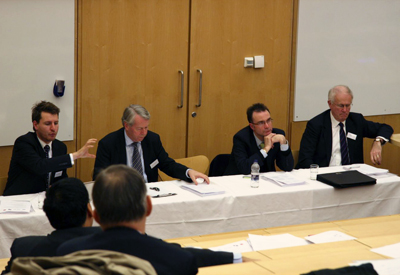29/30 November 2012
Joint Event
 Faculty members and students from the Law Faculty, Cambridge University and the Law Department, London School of Economics and Political Science, came together in Cambridge for a two day conference exploring new and emerging issues in financial regulation. The conference, which marked the launch of the Cambridge Masters' in Corporate Law, was organized by the Centre for Corporate and Commercial Law (Cambridge) and the Law and Financial Markets Project (LSE). The conference was financially supported by the Cambridge University JM Keynes Fellowship Fund, the Cambridge Endowment for Research in Finance, the LSE Law and Financial Markets Project and Herbert Smith Freehills LLP.
Faculty members and students from the Law Faculty, Cambridge University and the Law Department, London School of Economics and Political Science, came together in Cambridge for a two day conference exploring new and emerging issues in financial regulation. The conference, which marked the launch of the Cambridge Masters' in Corporate Law, was organized by the Centre for Corporate and Commercial Law (Cambridge) and the Law and Financial Markets Project (LSE). The conference was financially supported by the Cambridge University JM Keynes Fellowship Fund, the Cambridge Endowment for Research in Finance, the LSE Law and Financial Markets Project and Herbert Smith Freehills LLP.
The conference celebrated the publication of The Regulatory Aftermath of the Global Financial Crisis (CUP, 2012) by Eilís Ferran, Niamh Moloney, Jennifer Hill and John Coffee, Jr.
Keynote conversation
The conference opened with a conversation between US Securities and Exchange Commissioner Troy Paredes and Professor Brian Cheffins (Cambridge). In the course of this conversation, Commissioner Paredes reflected on a range of topics, including the fractionalized nature of the US financial regulatory system, the SEC’s thinking on the use of International Financial Reporting Standards, and the extent to which the SEC is influenced by regulatory developments in the EU and elsewhere when it formulates policy.
Interdisciplinary perspectives
 Professor Simon Deakin (Cambridge), Professor Martin Hellwig (Max Planck Institute, Bonn) and Professor Daniel Mügge (Amsterdam) shared the platform to discuss new perspectives on financial market regulation as viewed from their respective disciplines of law, economics and political science.
Professor Simon Deakin (Cambridge), Professor Martin Hellwig (Max Planck Institute, Bonn) and Professor Daniel Mügge (Amsterdam) shared the platform to discuss new perspectives on financial market regulation as viewed from their respective disciplines of law, economics and political science.
For Deakin, the key question was the use of insights from the social sciences to reshape financial regulation in the wake of the 2007-8 crisis. He suggested that there is unlikely to be a new 'single theory of everything' to replace Walrasian models of pure competition in financial (and other) markets but that there is a need to integrate into current thinking theories of the micro (individual agency as contextual rationality) and macro (markets as complex, adaptive systems). Empirical knowledge of legal systems ('leximetrics') must also be incorporated into into economic models.
Hellwig stressed that much remains to be done to achieve the goal of safeguarding financial stability, particularly with respect to bank resolution and crisis prevention. He highlighted the very limited progress that has been made to improve the handling of cross-border issues in bank resolution – an especially sobering insight when it is recalled that the problem of cross-border resolution was fully recognized at the time of the LTCM crisis, in 1998, but action was not taken. Ten years later, when the financial crisis struck, the seriousness of the omission became obvious. Yet, several years further along still, little has been achieved in this area.
Mügge’s core argument was that a key quality of good regulation is that it has been designed to withstand political stress. Accordingly, there is a need for regulatory policymaking to be stress tested. He outlined a number of ways in which such tests could be constructed.
Systemic risk and the regulatory sine curve
Professor John Coffee, Jr (Columbia), closed the formal part of the first day by presenting an update on his theory of the regulatory sine curve in financial regulation. His assessment was that financial regulators in the U.S. have not yet effectively implemented any prophylactic or market-based measure designed to constrain risk-taking by financial institutions. He expressed skepticism as to the impact of some reforms. In particular, the restrictions imposed on executive compensation have been equivocal at best and illusory at worst. He noted that while regulators seem to favour prudential supervision, prudential supervision maximizes the power and prestige of bureaucrats and it is hard to point to historical evidence that it has ever worked effectively. Coffee closed his remarks by noting that, to paraphrase Santayana, those ignorant of financial history may be destined to repeat it.
Banking Union and the position of the European Banking Authority
At the speakers’ dinner Andrea Enria, Chairman of the European Banking Authority, reflected on current proposals for the introduction of a single supervisory mechanism for the Eurozone as the first step towards a banking union. The conferral of supervisory powers on the ECB will give rise to a powerful new presence in the institutional architecture of financial market supervision in the EU. Chairman Enria delivered a thoughtful and thought-provoking assessment of the implications of this development for his Authority and for the single market in general.
Bank capital and bank corporate governance
Professor Paul Davies (Oxford) opened the second day of the conference with a paper on the liquidity and capital regulation of banks. Chiara Zilioli of the ECB commented. In his paper Davies explored the relative roles of capital and liquidity regulation in ensuring the safety and soundness of banks. In particular he examined the interrelationship of these two forms of regulation. He argued that to some significant extent capital and liquidity regulation can operate as substitutes, and examined the implications of this finding for public policymaking.
Professor Klaus Hopt (Max Planck Institute, Hamburg), considered recent regulatory efforts to support the better governance of financial institutions Professor Jennifer Hill (Sydney) commented. Regulatory intervention into the corporate governance of banks has gathered momentum since the financial crisis and still shows no sign of abating. In his wide-ranging paper, Hopt surveyed a number of lessons learned from the financial crisis about bank corporate governance and considered the regulatory responses. One empirical finding that he highlighted was the evidence that banks with more independent directors performed relatively poorly in the financial crisis. For Hopt, this work reinforced the doubts as to the benefits of overly strict independence requirements for board members given the trade-off between independence and competence.
Michael Ainley of the FSA closed this session by reflecting on the FSA’s experience as a prudential supervisor. He drew attention to the critical self-examination that the FSA had conducted in the aftermath of the crisis and to the contribution it has made to the development of new regulatory approaches.
New priorities: the regulatory perimeter; the financial consumer
Professor Guido Ferrarini (Genoa) presented a paper on the expanding EU regulatory perimeter around securities trading. Professor Iain MacNeil (Glasgow) commented. Ferrarini examined the extent to which the MiFID Review and the proposed MiFID II and MiFIR will expand the regulation of ‘public’ securities markets, while correspondingly reducing the scope of ‘private’ markets. He highlighted some related and significant weaknesses in the MiFID Review. He suggested that the benefits of ‘private’ markets for investors should be better considered, including with respect to liquidity provision, price impact protection, and lower execution costs. In particular, he argued that the possibility of trading equity instruments for growth companies on ‘private’ markets should be protected.
Professor Michael Barr (Michigan) presented a paper on the use of insights in behavioral economics in post-crisis regulatory reforms in the US, UK and the EU. Professor Niamh Moloney (LSE) commented. Barr emphasized the need for care to be taken in using such insights in fashioning regulatory responses and for policy attention to focus on firm, as well as investor, incentives and behaviour. In particular circumstances, rules based on trying to influence individual psychology through defaults might be too weak and changes in liability rules or other measures focused on changing the behavior of firms might also be needed.
Financial crisis and private law
In a joint paper Professor Michael Bridge (LSE) and Dr Jo Braithwaite (LSE) presented four case studies on the role of property law in financial institution insolvency proceedings. Their findings indicated that the use of private law to manage the fall-out from the financial crisis had come at a price, namely the impact on a number of fundamental legal principles that underpin the markets. They suggested that the highly pragmatic approach of the courts could in the longer term prove to have troubling consequences for the integrity of private law.
The organization of financial market supervision
Professor Eilís Ferran (Cambridge) presented a paper on the difficult first steps towards an EU banking union. Professor Howell Jackson (Harvard, and Visiting Goodhart Professor, Cambridge) commented. Ferran examined the legal, institutional, and political forces shaping the design of banking union and how these could from the outset undermine the ECB’s chances of being an effective prudential supervisor. She also considered whether banking union would threaten the unity and integrity of the EU single market.
Professor Chris Brummer (Georgetown) looked at the organization of financial market supervision at the global level, with particular reference to credit rating agency regulation. Dr Michael Waibel (Cambridge) commented. Brummer argued that in a world of increasingly multipolar power, we could see at least some semblance of symmetry in the regulatory posture of EU and US financial authorities over time.
Reflections
A panel session chaired by Professor Julia Black (LSE) closed the conference. The panelists were David Wright (IOSCO), Eric Pan (SEC) and Peter Parker (HMT/FSA). The session examined the complexities raised by the governance of international financial markets from national, regional and international perspectives. David Wright examined IOSCO’s role in the development of the post-crisis international rule book and warned of the risks which arise from the fragmentation of standard-setting and where enforcement of international standards is weak. Eric Pan highlighted the institutional complexities within the international financial architecture, using the Financial Stability Board as a case study. Peter Parker highlighted key risks arising from the EU’s home/host supervisory model and underlined the difficulties caused by operational cross-border supervision in particular.
Other contributions
The conference presentations sparked many questions from the floor and these stimulating debates were moderated by expert chairs. Those who contributed from the floor or as a panel chair included Karen Anderson (Herbert Smith Freehills), Professor Blanaid Clarke (Trinity College Dublin), Margaret Cole (PwC, formerly FSA), Professor Pierre-Henri Conac (Luxembourg), James Palmer (Herbert Smith Freehills), Professor Jenny Payne (Oxford) and Professor Sarah Worthington (LSE).
Three Cambridge PhD students presented posters summarizing their work in progress. They were: Valia Babis (Cross-border Banking Groups in the European Union); Toussant Boyce (Dynamic Financial Regulation); and Samuel Dahan (The Governance of EU Social Policy: from Open Coordination to Financial Stabilisation).
Publication
Selected papers from the conference will be published in the Journal of Corporate Law Studies (October 2013).
Speaker biographies are available to download.

